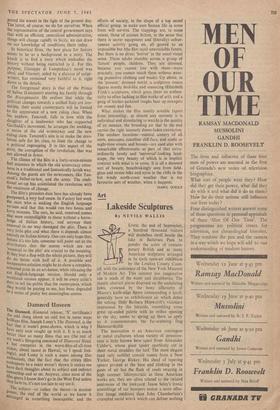Cinema
Unkindest Cut
By IAN CAMERON
FOR once the right film won the top award at Cannes: Luchino Visconti's The Leopard. Apart from the virtue of giving the Palme d'Or to the best film (The Birds, which opened the Festival, was not in the compe- tition), the award ought to have the effect of deterring those who wish to cut a work that needs to be shown intact.
The previous time that Visconti tried to make a film about the Risorgimento, with Senso, his view of history was not compatible with the national pride of the Italian censor, and the film was massacred. Now, backed by a best-seller of unimpeachable respectability, he has got his comments past the censor. But The Leopard Is a better film than Senso would ever have been, for this time Visconti has managed to people the nineteenth century with human beings, a commodity absent from bis earlier films even when, like La Terra Tretna, they had a contem- porary setting. Here he is aided by his three leading actors, Burt Lancaster, Claudia Cardinale and Alain Delon, all of whom are superb. It is particularly important for Visconti's method that his characters should be acceptable as people, because of his 'neo-realist' approach to history. He tries to film the past as if he were there at the time with a camera. He therefore uses real settings rather than reconstructing them in the studio. He presents the action with the viewpoints of those involved at the time, where he could have imposed twentieth-century viewpoints on his costumed figures, or inter-
preted the events in the light of the present day. The latter, of course, we do for ourselves. When the representative of the central government says that with an efficient, centralised administration, things will change rapidly in Sicily, we can draw on our knowledge of conditions there today.
In historical films, the best place for history seems to be as a background to a story. The knack is to find a story which embodies the history without being restricted to it. For this purpose, Giuseppe di Lampedusa's novel was ideal, and Visconti. aided by a platoon of script- writers, has remained very faithful to it, right down to the details.
The foreground story is that of the Prince of Salina (Lancaster) steering his family through the Risorgimento. He realises that while the political changes towards a unified Italy are irre- sistible, their social counterparts will be limited to the appearance of a new ruling class. When his nephew, Tancredi, falls in love with the daughter of a landowner who has supported Garibaldi's movement, he arranges the wedding, a union of the old aristocracy and the new ruling class. Tancredi's aim is to make the revo- lution safe for his class, to limit the change to a political regrouping. It is this aspect of the Story, the corruption of the revolution, that was not allowed in Senso.
The climax of the film is a forty-seven-minute ball sequence in which the old aristocracy enter- tains in a traditional and fantastically lavish way. Among the guests are the newcomers, like Tan- credi's father-in-law, and the army. The tradi- tional set-up has assimilated the revolution with the minimum of change. The film's premiere date here has already been Postponed, a very bad omen. In Variety last week the man who is making the English language version said that this would run two hours and forty minutes. The cuts, he said, removed scenes that were unintelligible to those without a know- ledge of Italian history, and anyway their removal in no way damaged the plot. There is very little plot and what there is depends almost entirely on Italian history. One can only hope that, before it's too late, someone will point out to the distributors that the scenes which are not essential to the plot' are crucial to the meaning.
they fear a flop with the whole picture, they will !lo 00 better with half of it. A possible and inexpensive solution might be to show a complete, subtitled print in an art-house, while releasing the Cot English-Ianguage version. Should only a mutilated version appear, it will be every critic's duty to tell his public that the masterpiece, which they would be paying to see, has been degraded to a series of pretty but meaningless scenes.











































 Previous page
Previous page